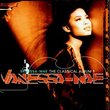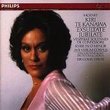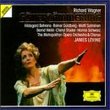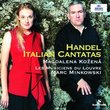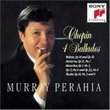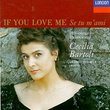| All Artists: Richard [1] Strauss, Clemens Krauss, Vienna Philharmonic Orchestra, Anton Dermota, Christel Goltz, Else Schurhoff, Franz Bierbach, Hans Braun, Harald Proglhoff, Herbert Alsen, Hermann Gallos, Hugo Meyer Welfing, Julius Patzak, Kurt Preger, Ljubomir Pantscheff, Ludwig Weber, Margaret Kennedy, Murray Dickie, Rudolf Christ, Walter Berry Title: Clemens Krauss conducts Strauss: Salome, The 1954 Decca Recording Members Wishing: 0 Total Copies: 0 Label: Decca Release Date: 8/10/2004 Genre: Classical Style: Opera & Classical Vocal Number of Discs: 2 SwapaCD Credits: 2 UPCs: 028947560876, 002894756087 |
Search - Richard [1] Strauss, Clemens Krauss, Vienna Philharmonic Orchestra :: Clemens Krauss conducts Strauss: Salome, The 1954 Decca Recording
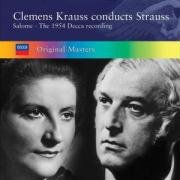 | Richard [1] Strauss, Clemens Krauss, Vienna Philharmonic Orchestra Clemens Krauss conducts Strauss: Salome, The 1954 Decca Recording Genre: Classical |
Larger Image |
CD DetailsSimilarly Requested CDs |
CD ReviewsUnassuming High Class Roberto Guillermo Bopp | Roberto Bopp"botánico" | 06/13/2005 (5 out of 5 stars) "The VPO at its best, a constellation of experienced voices submerged in their characters and a conductor that shares with the performers an estilistic homogeneity which nowadays is rarely heard in opera performances. Oscar Wilde's plot is contemporary, rooted in Western idiosincrasy. Here we are spared two emasculating detours encountred in other approaches to Salomé: the mad house; the savage perverts. This Salomé means business, and that is splendid music and the finest psicology. The sound is great.I suggest reading the theater play first, as a libretto is lacking (except for minor differences, they are almost identical).This recording is a great experience in style, and a joy to the ear too." Indispensable, if somewhat Archaic The Cultural Observer | 01/10/2009 (5 out of 5 stars) "Aside from Karl Böhm, Strauss' conductor of choice during the last decades of his life was the Austrian Clemens Krauss, a genius of conducting whose recorded potential was cut short due to an early death. Clemens Krauss' sparse discography is capped by the magnificent Ring Cycle he immortalized on disc from the 1953 Bayreuth Festival. Through his conducting and his lineup of magnificent singers are listeners treated to one of the most alive, narrative, brisk, yet well calculated Rings ever committed to the recorded media. A year later, he was dead, leaving many more years of great music making only in the imaginations of those who wanted more evidence of his brilliance. To imagine a Tristan from him! He was, however, at least able to offer a Salome of great distinction. His mastery of the baton is evidenced in this recording by the clarity of his orchestra and the well judged tempi that basically allows the score to conduct itself. Few conductors can come close to Krauss' understanding of Strauss' massive orchestra and how one can effectively make the individual voices, especially those of the singers, heard effectively without swamping all the other parts in an orgiastic ocean of sound. Karajan is one of them, and so is Böhm, but Krauss was the grand master of the Straussian band and how he manipulates them here is a testament to his greatness. His cast of singers is brilliant too, with the late Austrian soprano Christel Goltz calling attention to her powerful and subtly characterized Salome. She neither has the missile-like authority of Birgit Nilsson nor the loony yet devastating characterization of Leonie Rysanek, but what she creates is a credible panther of the stage. She is never singing on bad taste, and her control is simply outstanding. Few other singers could boast the kind of musical and histrionic balance that she gives to this Salome. The rest of the singers are not starry names, save Julius Patzak's Herod, but all of them are hand-picked to deliver Krauss' exacting vision of Salome that while never excessive or flamboyant delivers the goods and gives us a document of Straussian conducting at its finest and most authentic." Still One of the Great Salome Recordings D. A Wend | Buffalo Grove, IL USA | 02/02/2010 (5 out of 5 stars) "Clemens Krauss was a great conductor and close associate of Richard Strauss, collaborating of the composer's final opera Capriccio. We are fortunate to have this complete recording of Salome from him. As noted, this recording was made in 1954, and despite its age and mono sound it remains among the top choices for Salome. Among the reasons for lauding this performance is the attention Clemens Krauss brings to the score, bring forth orchestral details that other composers do not.
The cast is also remarkable with Julius Patzak as Herod Antipas and Hans Braun as Jokanaan. Patzak is especially good when Herod begins to loose touch with reality and the scene where he tries to persuade Salome from taking Jokanaan's head comes off very well. Salome is sung by a veteran of the role Christel Goltz. Her voice tends at times toward harshness but she puts a great deal of energy into the role. On stage, as I have read, Ms. Goltz was a force to be reckoned with and gave a vivid performance of Salome and many other roles. Her final scene with the severed head of Jokanaan is marvelously sung. Cheryl Studer is probably the ideal Salome. Her voice has a child-like sweetness and expresses the spoiled teenager quality that brings Salome to life. The smaller roles are well cast: Margareta Kenney makes a shrill Herodias, Narraboth is nicely sung by Anton Dermota and the Page, whose pleading Narraboth ignores, is sung by Else Schurhoff. The Vienna Philharmonic is on top form and the balance between voices and orchestra is superb. Krauss' Salome is one that I will keep beside my digitally sonic recordings of the opera. " |

